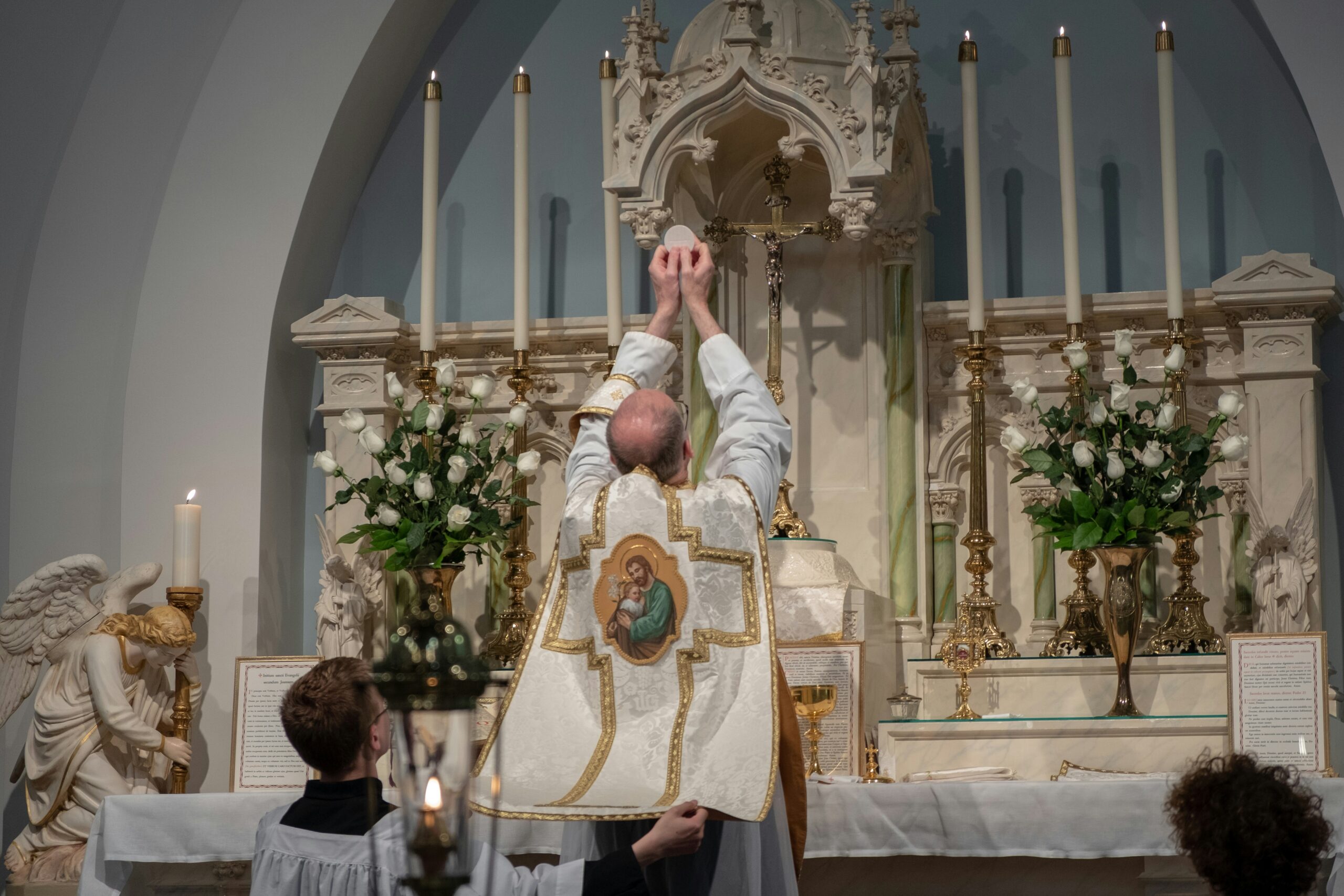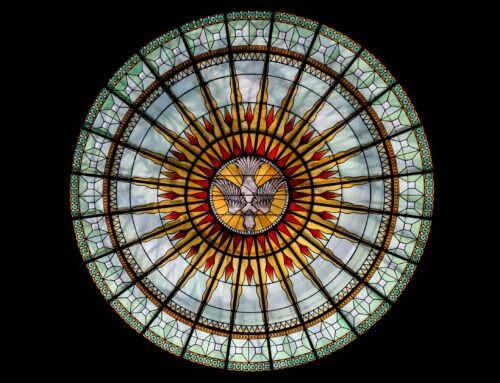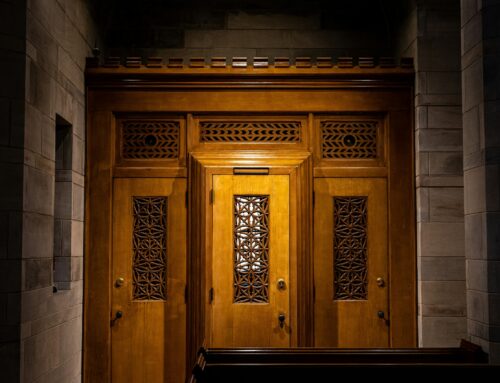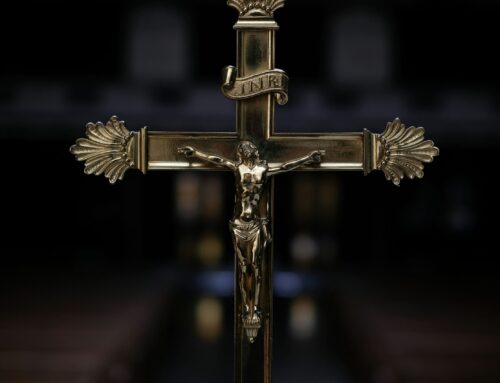The Holy Eucharist is the source and summit of the Christian life (Catechism of the Catholic Church, 1324). As part of this 7-part series on the Sacraments, we delve into the Sacrament of the Eucharist—its profound significance in the life of the Church, its connection to Christ’s sacrifice, and how it draws us deeper into communion with God.
What is the Sacrament of the Holy Eucharist?
The Holy Eucharist is both a sacrament and a sacrifice, commemorating and making present the Last Supper and Christ’s sacrificial death on the cross. Catholics believe that in the Eucharist, ordinary bread and wine become the actual body and blood of Jesus Christ through the process of transubstantiation. This transformation is not symbolic but real—Christ becomes truly, substantially present under the appearance of bread and wine. The Eucharist stands at the very center of Catholic life, often referred to as the “source and summit” of the Church’s faith and worship (Catechism of the Catholic Church, 1324).
This sacrament was instituted at the Last Supper, when Jesus told His apostles, “This is my body, which is given for you; do this in remembrance of me” (Luke 22:19). In giving His body and blood, Jesus not only foreshadowed His crucifixion but also left behind a means by which His followers would be nourished spiritually and united with Him until His return.
The Real Presence of Christ
One of the most important aspects of the Eucharist is the belief in the Real Presence of Jesus. During Mass, through the words of consecration spoken by the priest—“This is My Body” and “This is My Blood”—the bread and wine are changed into Christ’s body and blood. The substance of the elements is transformed, though their physical appearances remain unchanged. This doctrine is grounded in John 6:51-58, where Jesus declares, “Unless you eat the flesh of the Son of Man and drink His blood, you have no life in you.”
This teaching underscores that when Catholics receive the Eucharist, they are not merely consuming bread and wine but are receiving Jesus Himself, fully and completely—body, blood, soul, and divinity.
The Eucharist in the Life of the Church
The Eucharist holds a central place in Catholic worship. It is celebrated during every Mass and is considered both a sacrifice and a meal. The Mass re-presents Christ’s sacrifice on Calvary in an unbloody manner, allowing believers to unite their lives with His offering. Additionally, the Eucharist is a sacrament of communion, bringing the faithful into deeper union with Christ and with one another as the Body of Christ.
The Eucharist nourishes the soul, giving believers the grace needed to live in friendship with God and resist sin.
Biblical Foundations of the Eucharist
The doctrine of the Holy Eucharist is deeply rooted in Scripture, drawing on multiple passages that reveal God’s desire to unite Himself with His people through a sacred meal. The Eucharist not only commemorates Christ’s Last Supper but also fulfills Old Testament prefigurations, such as the manna in the desert and the Passover lamb. Here’s a closer look at the biblical foundations for the Church’s belief in the Real Presence and the Eucharist as both a sacrament and a sacrifice.
The Institution of the Eucharist – The Synoptic Gospels and St. Paul
The institution of the Eucharist is explicitly recorded in the Synoptic Gospels (Matthew, Mark, and Luke) and in 1 Corinthians. At the Last Supper, Jesus shares bread and wine with His disciples, declaring, “This is my body… This is my blood” (Matthew 26:26-28). He commands them to “do this in remembrance of me” (Luke 22:19), instituting the sacrament that would allow believers to partake in His body and blood throughout the ages.
This account is reiterated by St. Paul in 1 Corinthians 11:23-26, where he emphasizes that every celebration of the Eucharist recalls Christ’s death until He comes again. St. Paul’s teaching reflects the early Church’s belief that the Eucharist was both a sacred memorial and a way to make Christ’s sacrifice present in their midst.
The Bread of Life Discourse – John 6:22-59
One of the most profound biblical foundations for the Eucharist comes from John 6, known as the Bread of Life Discourse. In this passage, Jesus tells His followers:
“I am the living bread that came down from heaven. Whoever eats this bread will live forever. And the bread that I will give is my flesh for the life of the world” (John 6:51).
The people struggle to understand Jesus’ words, and many walk away, finding His teaching difficult to accept. However, Jesus does not backtrack or offer a symbolic interpretation. Instead, He doubles down:
“Whoever eats my flesh and drinks my blood has eternal life, and I will raise him up on the last day. For my flesh is true food, and my blood is true drink” (John 6:54-55).
This passage forms a critical foundation for the Catholic belief in the Real Presence of Christ in the Eucharist. Jesus emphasizes that His body and blood are truly given as spiritual food, not merely as a symbol or metaphor, but as a reality that offers eternal life.
Prefigurations in the Old Testament
The Eucharist is also foreshadowed throughout the Old Testament, revealing God’s plan to nourish His people with His very self.
- The Manna in the Desert (Exodus 16): When the Israelites wandered in the wilderness, God provided them with manna, a mysterious bread from heaven, to sustain them. This prefigures the Eucharist, which Jesus refers to in John 6:31-33: “It was not Moses who gave you bread from heaven; my Father gives you the true bread from heaven.” The Eucharist is the new manna, a supernatural gift that nourishes believers spiritually.
- The Passover Lamb (Exodus 12): The Passover celebration involved sacrificing a lamb and eating it as a memorial of God’s saving act. Jesus, as the Lamb of God, offers Himself as the perfect sacrifice for the redemption of humanity. In the Eucharist, believers partake in the sacrificial meal, uniting themselves with Christ, who is both the Lamb and the Host.
The Eucharist as a Covenant Meal
Throughout Scripture, covenants are often sealed with a shared meal. In Genesis 14:18-20, the priest-king Melchizedek offers bread and wine to bless Abram, prefiguring the Eucharistic offering. Likewise, the Last Supper is not just a farewell meal but the institution of the New Covenant, sealed by the sacrifice of Christ. Jesus declares, “This is the new covenant in my blood, which will be shed for you” (Luke 22:20).
The Eucharist, therefore, is not only a memorial of Christ’s death but also a celebration of the New Covenant—a covenant of grace and eternal life offered to all who believe and participate in this sacred meal.
Participation in the Sacrifice – Hebrews 9-10
The Letter to the Hebrews offers further theological depth by explaining how Christ’s sacrifice on the cross fulfills and surpasses the sacrifices of the Old Covenant. While the Old Testament required repeated offerings, Christ’s sacrifice is perfect and eternal. Through the Eucharist, believers are invited to participate in this once-for-all sacrifice.
“For by one offering he has made perfect forever those who are being consecrated” (Hebrews 10:14).
Each time the Eucharist is celebrated, the one sacrifice of Calvary is made present, and believers are drawn into the mystery of Christ’s redeeming love.
Effects of Receiving the Eucharist
Receiving the Eucharist brings profound spiritual benefits, including:
- Union with Christ: Communion deepens our relationship with Jesus and helps us grow in holiness.
- Forgiveness of Venial Sins: The Eucharist cleanses us of lesser sins, making our souls more receptive to God’s grace.
- Strength to Avoid Sin: Regular participation in the Eucharist strengthens us against temptation and encourages virtuous living.
- Unity with the Church: By sharing in the one bread and one cup, the Eucharist fosters unity within the Body of Christ, the Church.
Who Can Receive the Eucharist?
To receive the Eucharist worthily, Catholics must:
- Be in a state of grace (free from mortal sin). If someone is conscious of mortal sin, they must receive the Sacrament of Reconciliation before approaching Communion.
- Fast for one hour before receiving the Eucharist.
- Believe in the Real Presence of Christ in the Eucharist.
The Eucharist is a gift meant to nurture the soul, and receiving it with the proper disposition ensures the fullness of its grace.
How the Eucharist Transforms Daily Life
The Eucharist invites us to live out Christ’s love in our daily actions. Just as we receive the body of Christ during Mass, we are called to be Christ to others—serving, forgiving, and loving generously. Participation in the Eucharist encourages us to live with gratitude, knowing that Christ gives Himself fully to us.
Through Eucharistic Adoration, Catholics can also spend time in the presence of Jesus, deepening their personal relationship with Him outside of Mass. This practice nurtures a spirit of prayer and reflection that carries into everyday life.
The Eucharist and Eternal Life
Jesus promised that whoever eats His body and drinks His blood will have eternal life (John 6:54). The Eucharist is a foretaste of the heavenly banquet, where believers will one day share in the fullness of God’s presence. It strengthens our hope in the resurrection and prepares us for eternal communion with God.
The Source and Summit of the Christian Life
The Sacrament of the Holy Eucharist lies at the heart of Catholic life, offering both spiritual nourishment and communion with Christ. Through it, believers participate in the ongoing mystery of Jesus’ sacrifice, growing in love, unity, and grace. The Eucharist not only draws us closer to God but also equips us to share His love with the world.
In Part 4 of this 7 Sacraments series, we’ll explore the Sacrament of Confirmation—the sacrament that strengthens and seals our faith journey. Stay tuned!







Leave A Comment